The Impact of Brexit on Gold Prices, UK Politics and the Economy
28/11/2019Daniel Fisher
Free & fully insured UK Delivery. Learn more
Secure & flexible payments. Learn more

Buyback Guarantee Learn more
We last wrote in detail about the topic of Brexit in August 2017 and it’s an understatement to say that a lot of water has passed under many bridges since then! So, another article is well overdue, so please read our views on “The impact of Brexit on Gold Prices, UK Politics and the Economy”. As we are UK-based, this article will have a UK-perspective. All assumptions are as at 29th November 2019 – opinions and facts change daily (it seems) – but this was our viewpoint at the time of writing!
Everybody knows about Brexit, but we thought it would be a useful start to define what Brexit is. To do this, we have used the Cambridge English Dictionary definition:
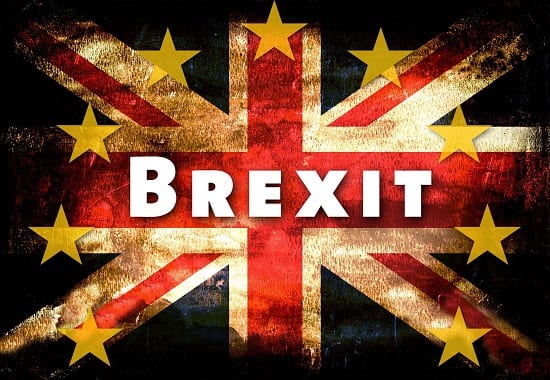
Brexit – the act of leaving the EU by the UK
This BBC article is also very interesting about the rapid adoption of the word “Brexit” into the English language along with words such as Brexiteer.
A full Brexit involves leaving both the single market and customs union. We discuss the different ways Brexit could be implemented next.
There is no “one size fits all” for Brexit. This is one of the reasons that the UK parliament has struggled so much to vote Brexit through. We list below the different varieties of Brexit and in particular the implications they have for gold investment.
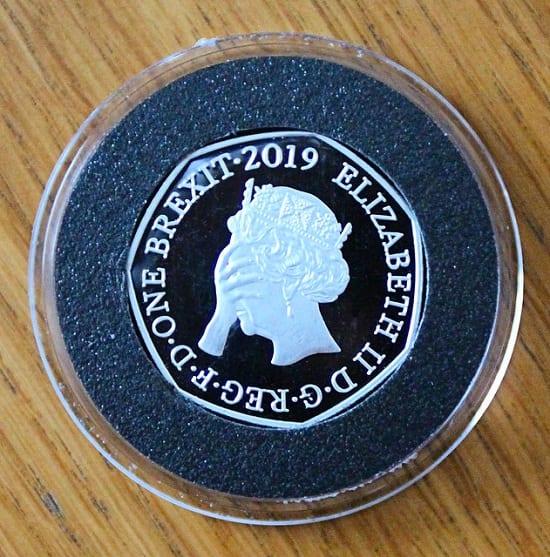
Whatever your Brexit preference to many it’s all a big nightmare!
Although UK PM Boris Johnson has agreed on a deal in principle with the EU a no deal is still very much a possibility. The UK could still complete Brexit without a deal if the withdrawal agreement is not signed off by January 31st, 2020 or by December 31st, 2020 (the end of the transition period). A no deal is looking much less likely (than it was at one stage), but if the Conservatives won by a significant parliamentary majority in the December election the chances of a no deal would increase.
In the event of a no deal, there would be 
Markets hate uncertainty, a no deal Brexit causes the highest amount of uncertainty possible. If a no deal Brexit happened the likelihood would be a surge in demand for gold, which would snowball as investors sought a safe haven investment. The price of £ sterling would also be very likely to fall at this point.
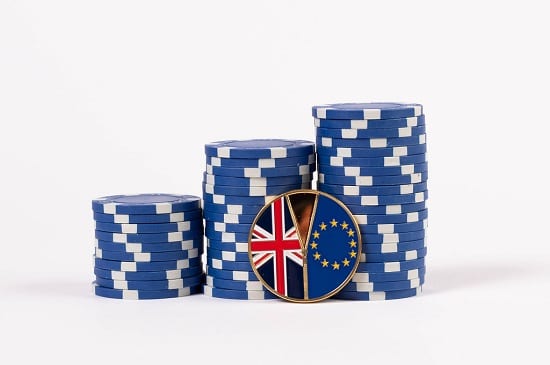
A hard or no deal Brexit will feel like a gamble to many investors, they are likely to turn to assets like gold
This is a deal based Brexit where the UK leaves the EU entirely, there would be no freedom of movement for workers and the UK would not have access to the single market. A hard Brexit is favoured by many Conservative MP’s but was difficult to negotiate with the EU. The harder the Brexit the more likely a no-deal scenario became.
From an investment perspective, a hard Brexit would again create uncertainty. Investors would be very likely to sell UK company shares and seek alternative safe haven investments such as gold. As a currency, £ sterling would weaken following a hard Brexit. The British economy would struggle for a period until new international trade deals could be negotiated with the EU and the rest of the world. Investments in the UK would reduce, so attracting capital would be likely problematic for a period.
Although a hard Brexit would cause an increased demand for gold, this spike in demand would be much less than a no-deal scenario would cause.
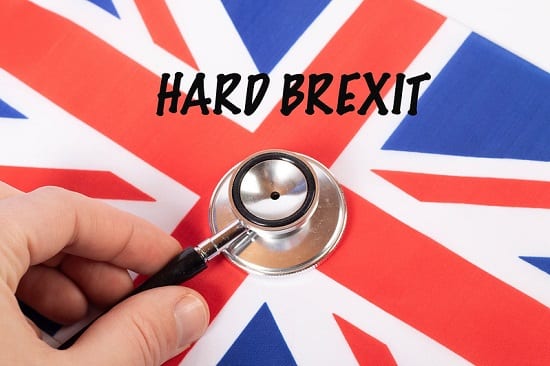
A hard Brexit is a favoured option of many Conservative MP’s
This once again is a deal based Brexit where the UK leaves the EU but remains a part of the EU single market. This is the part of the EU, which allows the free movement of goods and people within EU member countries. This variety of Brexit is favoured by some Conservative MP’s as well as those of opposition parties.
The only realistic scenario for a soft Brexit is if the Labour party won. Following a second referendum, it is considered quite likely that Labour party members would prefer a soft Brexit to protect workers jobs and cause as little disturbance to the UK economy as possible.
A soft Brexit still represents the UK leaving the EU. This, therefore, creates uncertainty and a likelihood that some investors would seek a safe haven investment such as gold. The impact on gold prices of a soft Brexit would be somewhere between those seen of a no Brexit and hard Brexit.
There is still a chance that Brexit may never happen! This would only arise if Labour, Liberal Democrats or a coalition government win the December 2019 election. This looks like an outside possibility as the Conservatives are favourite to win the election.
If the Liberal Democrats win the election, the results of the 2016 referendum would be ignored and the UK would stay in the EU. If Labour wins, there would be a second referendum where the UK would once again vote (often called “The People’s Vote) to remain or to leave. If Remain won this second referendum, then there would be no Brexit.
Download our FREE 7-Step Cheatsheet To Tax Free Gold & Silver Investment. CLICK HERE
A no Brexit scenario is actually pretty much “business as usual” and would cause if anything a slight reduction in the gold price as the outlook is more certain. The gold price would once again align with other global factors such as the US$ and other world financial influencers.
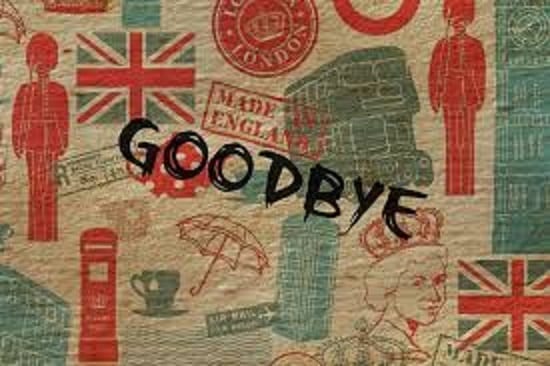
Whatever your views on Brexit if the UK leaves it is the end of an era
Largely due to the failure of the Conservative government to deliver Brexit, a general election was announced following an MP’s vote on 29th October, 2019. The election takes place on 12th December 2019. This is the first time there has been a UK December general election since 1923. We discuss the possible outcomes of the election below.
This is the most likely outcome, as the Conservative party are widely expected to win the UK election. They may not though have enough of a majority to implement their preferred Brexit and may need to enter a coalition government most likely with the Brexit Party and Democratic Unionist Party (DUP).
Depending on the majority the Conservatives hold they would implement either a hard Brexit or no deal (if a deal can’t be agreed with the EU).
This is a possible outcome with a coalition government appearing more likely than an outright labour party win. Labour could form a coalition with SNP (Scottish Nationalist Party) and/or Liberal Democrats.
With a labour majority, there would be a second referendum (a “People’s Vote”). This still has a high chance of a leave outcome, but with a Labour government in charge, the likelihood would be a soft Brexit. Both the SNP and Liberal Democrats want to remain, so any coalition with these parties by Labour would create problems for Labour actually leaving the EU.
The price of Labour forming a coalition with the SNP would be to allow a second Scottish Referendum vote. This in its own way creates future uncertainty and would possibly mean that Scotland could remain as an EU member or re-join if the UK has already left.
A Liberal Democrats win is extremely unlikely. If the Liberal Democrats were to win an overall majority, they would keep the UK within the EU. This would have a stabilising effect on the gold price as the UK stays as it is now, this retains the “status quo” and breeds certainty.
There is a distinct possibility that after all the votes are counted that no party wins and there is a minority government (most likely Conservative but maybe Labour). In this event, Conservative or Labour are likely to seek a coalition government. Just before the December 2019 elections were called this is the situation PM Boris Johnson faced, which is why he couldn’t easily get his hard Brexit deal voted through parliament. Although a deal was eventually agreed, the timescales for it weren’t – so PM Johnson decided to call an election to sort the Brexit chaos out!
If all attempts to create a coalition government fail, then the UK will effectively have a hung parliament with no party able to effectively lead. This in itself would create great uncertainty in the UK and would lead some investors to safe haven investments such as gold.
For Brexit, a hung parliament would most likely mean further delays. With no government able to implement their policies, a no deal/hard/soft Brexit could not be agreed. Eventually, it can only be assumed that there would be another election to try all over again to get a majority government.
Click here to download our Free Insider’s Guide to Gold & Silver Investing
It’s worth mentioning that the current deadline for the UK to leave the EU is now set at 31st January 2020. This deadline could be brought forward if agreement on a deal was reached by MP’s.
As a future date, the UK transition period for the UK leaving the EU concludes on 31st December 2020.
The whole Brexit scenario impacts gold prices through uncertainty. Investors love certainty and detest uncertainty. Due to Brexit, particularly in the advent of a no deal or hard Brexit, many investors (particularly those in the UK) will seek a safe haven for their investments.
Your Dictionary defines safe haven investments as:
We haven’t seen too much Brexit-related safe haven investment yet as Brexit is not classed as “imminent”. When/if Brexit happens, this is the point at which there is likely to be a surge in safe haven gold investment.
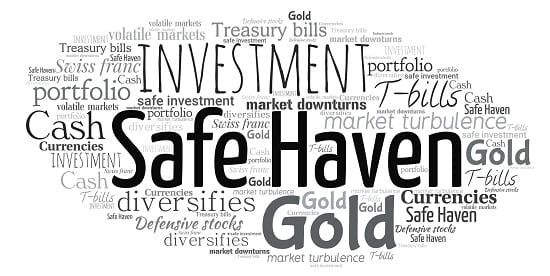
Investors love safe haven investments like gold in times of economic uncertainty
Investments in the UK government, e.g. bonds and gilts – although classed as a low-risk investment will lack appeal. Investors will seek alternative safer places to invest their funds, which would include foreign government investments and also in gold and other precious metals.
Many political commentators are predicting a “ripple effect” following the UK’s decision to leave the EU, with other countries following (like “rats deserting a sinking ship”). This “ripple effect” hasn’t quite happened yet as the UK hasn’t actually left.
There is an impending fear though that Brexit could cause a fracturing of the EU leading to an eventual disintegration and an end to globalisation.
These factors are likely to lead to a lack of confidence in the EU by investors generally and for alternative investments to be sought. One of these would be gold.
Following the UK’s decision to leave back in 2016 there was a knock-on effect on UK equities. Following any actual UK exit, there would be a high likelihood of downgrading of UK equities and also European equities.
Upon Brexit occurring UK businesses would be faced with a range of new issues. There would be increased regulations and red tape, difficulty of access to migrant worker visas, new trade tariffs and also restrictions to parts and materials. All of these are likely to reduce the profitability of UK businesses (especially those with high exposure to import/export), which ultimately means these equities will be less attractive to investors. This will be the case especially in the short-medium term as the consequences of Brexit become clearer.
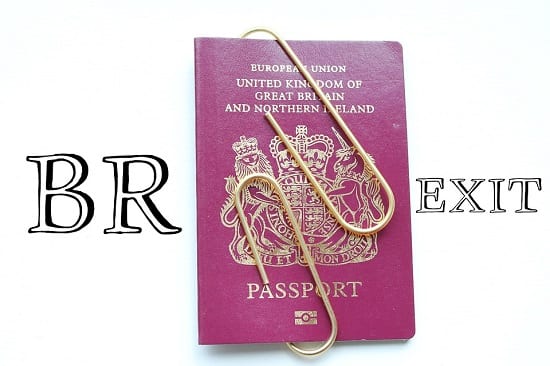
Passports would be one example of a potential regulation change following Brexit
The UK is a main market for many European countries (France and Germany especially). Therefore, the same issues impacting UK businesses will also impact some European businesses too in a similar way. Trade tariffs added by the UK/EU, for example, would impact businesses, which currently trade without such tariffs.
In a climate where UK & European businesses are less profitable and therefore less investable the inevitable outcome is that investors will seek other investments. Gold will be in a prime position to take advantage of new investment funds.
There will be some currency fluctuation of both £ sterling and Euro relating to Brexit, infact we have already seen this with past Brexit announcements.
Currency investors faced with an actual exit of the EU by the UK are likely to choose to hold their cash in liquid assets such as gold rather than £ sterling, which is riskier due to the Brexit process. Although gold worldwide is priced primarily in $, the price per oz in £ sterling can be expected to rise post Brexit due to a weakening of the currency.
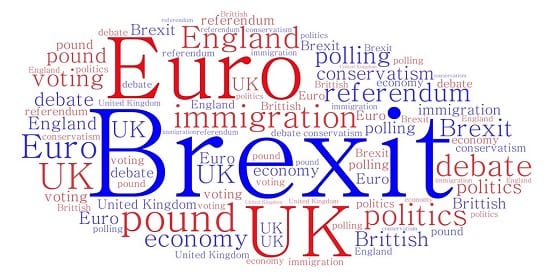
Enjoy our word cloud of Brexit related words!
We appreciate that Brexit brings uncertainty and concerns to investors. If you would like to discuss any aspect of diverting investment funds into gold investment, then contact us by calling (020) 7060 9992 or alternatively complete our contact form. We will be pleased to help and can offer a wide range of gold coins, gold bars and silver investments.
Image Credits: Stux, Mick Baker (Rooster), Marco Verch, Wuestenigel, Public Domain, Ben Taylor 55, Public Domain and Scooter Genius 02
Naturally, this blog represents the views of Physical Gold Ltd. We would always recommend that customer’s complete their own research and seek impartial investment advice before acting on any of the content in this article.
Live Gold Spot Price in Sterling. Gold is one of the densest of all metals. It is a good conductor of heat and electricity. It is also soft and the most malleable and ductile of the elements; an ounce (31.1 grams; gold is weighed in troy ounces) can be beaten out to 187 square feet (about 17 square metres) in extremely thin sheets called gold leaf.
Live Silver Spot Price in Sterling. Silver (Ag), chemical element, a white lustrous metal valued for its decorative beauty and electrical conductivity. Silver is located in Group 11 (Ib) and Period 5 of the periodic table, between copper (Period 4) and gold (Period 6), and its physical and chemical properties are intermediate between those two metals.